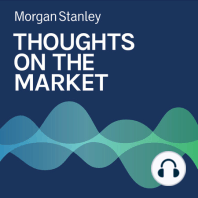3 min listen

Mid-Year Economic Outlook: Slowing or Stopping?
Mid-Year Economic Outlook: Slowing or Stopping?
ratings:
Length:
10 minutes
Released:
May 18, 2022
Format:
Podcast episode
Description
As we forecast the remainder of an already uncertain 2022, new questions have emerged around economic data, inflation and the potential for a recession. Chief Cross Asset Strategist Andrew Sheets and Chief Global Economist Seth Carpenter discuss.-----Transcript-----Andrew Sheets: Welcome to Thoughts on the Market. I'm Andrew Sheets. Morgan Stanley's Chief Cross-Asset Strategist. Seth Carpenter: And I'm Seth Carpenter, Morgan Stanley's Chief Global Economist. Andrew Sheets: And today on the podcast, we'll be talking about our outlook for strategy and markets and the challenges they may face over the coming months. It's Tuesday, May 17th, at 4 p.m. in London. Seth Carpenter: And it's 11 a.m. in New York. Andrew Sheets: So Seth, the global Morgan Stanley Economic and Strategy Team have just completed our mid-year outlook process. And, you know, this is a big collaborative effort where the economists think about what the global economy will look like over the next 12 months, and the strategists think about what that could mean for markets. So as we talk about that outlook, I think the economy is the right place to start. As you're looking across the global economy and thinking about the insights from across your team, how do you think the global economy will look over the next 12 months and how is that going to be different from what we've been seeing? Seth Carpenter: So I will say, Andrew, that we titled our piece, the economics piece, slowing or stopping with a question mark, because I think there is a great deal of uncertainty out there about where the economy is going to go over the next six months, over the next 12 months. So what are we looking at as a baseline? Sharp deceleration, but no recession. And I say that with a little bit of trepidation because we also try to put out alternative scenarios, the way things could be better, the way things could be worse. And I have to say, from where I'm sitting right now, I see more ways for the global economy to be worse than the global economy to be better than our baseline scenario. Andrew Sheets: So Seth, I want to dig into that a little bit more because we're seeing, you know, more and more people in the market talk about the risk of a slowdown and talk about the risk of a recession. And yet, you know, it's also hard to ignore the fact that a lot of the economic data looks very good. You know, we have one of the lowest unemployment rates that we've seen in the U.S. in some time. Wage growth is high, spending activity all looks quite high and robust. So, what would drive growth to slow enough where people could really start to think that a recession is getting more likely?Seth Carpenter: So here's how I think about it. We've been coming into this year with a fair amount of momentum, but not a perfectly pristine outlook on the economy. If you take the United States, Q1, GDP was actually negative quarter on quarter. Now, there are a lot of special exceptions there, inventories were a big drag, net exports were a big drag. Underlying domestic spending in the U.S. held up reasonably solidly. But the fact that we had a big drag in the U.S. from net exports tells you a little bit about what's going on around the rest of the world. If you think about what's going on in Europe, we feel that the economy in the eurozone is actually quite precarious. The Russian invasion of Ukraine presents a clear and critical risk to the European economy. I mean, already we've seen a huge jump in energy prices, we've seen a huge jump in food prices and all of that has got to weigh on consumer spending, especially for consumers at the bottom end of the income distribution. And what we see in China is these wave after wave of COVID against the policy of COVID zero means that we're going to have both a hit to demand from China and some disruption to supply. Now, for the moment, we think the disruption to supply is smaller than the hit to demand because there is this closed loop approach to manufacturing. But
Released:
May 18, 2022
Format:
Podcast episode
Titles in the series (100)
Mike Wilson: Are U.S. Economic Indicators Flashing Yellow? by Thoughts on the Market